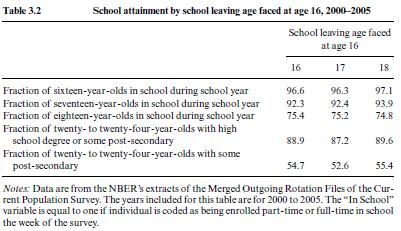
Using compulsory attendance laws to estimate the causal effect of education on outcomes has been hot in economics for over a decade. But I was always a skeptic. The idea that minimum schooling leaving laws are exogenous is bizarre, yet the political and social processes that generate these laws are fuzzy at best. Hence, these laws are bad instrumental variables. Disagree? How far would this literature have gone if it readily reached the “wrong” conclusion that education is a waste of time?
These state-level changes in schooling requirements are used as instrumental variables to examine the impact of increased schooling on a wide range of outcomes including wages, mortality, incarceration, and the social returns to schooling Acemoglu and Angrist 2001; Lochner and Moretti 2004; Lleras-Muney 2005; Oreopoulos 2006). Identification of these effects is achieved by exploiting variation in the timing of the law changes across states over time such that different birth cohorts within each state have different compulsory schooling requirements. Key to this identification strategy, typically implemented in specifications that include state of birth and year of birth fixed effects, is that all other changes which occur across states during this period are uncorrelated with the law changes, educational improvements, and the outcomes under investigation.[…]In this paper, we examine the importance of the common trends assumption for estimates of the benefits of schooling when using schooling laws as instruments. In samples commonly used in the prior literature (the 1960-1980 US censuses) and across a number of outcomes including wages, occupational status, unemployment, and divorce, we find statistically significant causal effects of increased schooling when using the baseline specification which includes state of birth and year of birth effects. However, these estimates become insignificant and, in many instances, “wrong-signed” when using specifications in which the year of birth effects vary across the four US census regions of birth.
Stephens and Yang go on to point out a big pile of other compatible papers I’ve hitherto overlooked:
As a point of comparison, the recent empirical literature which estimates the returns to schooling using compulsory schooling law changes outside of the United States finds either small or zero returns. Since, unlike in the United States, these reforms affected a substantial share of the population, we view many of these studies as providing compelling evidence of the impact of compulsory education. Black, Devereux, and Salvanes (2005) find returns to schooling of 4 and 5 percent for men and women, respectively, due to Norwegian schooling reforms in the 1960s. Devereux and Hart (2010) find that the 1947 schooling reform in the United Kingdom yields estimated returns of 7 and 0 percent for men and women, respectively. Meghir and Palme (2005) find an overall small and insignificant return to schooling due to Swedish schooling reforms in the 1950s although they do find evidence of heterogenous returns by father’s education level. Pischke and von Wachter (2008) find zero returns to schooling in Germany following a post-World War II schooling expansion and Grenet (2013) finds no returns to schooling following a 1967 education reform in France. Although the identification strategies in these studies either exploit variation across states, similar to the United States, or variation induced by a national reform, our estimates of the rate of return to schooling are comparable to the growing body of international evidence on the returns to education.
If you’re tempted to remain agnostic, consider this: Top economics journals almost never publish critiques. To get through the refereeing process, Stephens and Yang almost certainly had to overcome strong resistance from a series of elite referees who authored the very research they’re taking down. If these meta-considerations don’t win you over, nothing will.

READER COMMENTS
Bostonian
Oct 24 2014 at 11:31am
Do the cited studies bolster or weaken the case for extending compulsory attendance laws through age 18?
Anne
Oct 25 2014 at 10:52am
@ Bostonian…The critique Professor Caplan shares here certainly doesn’t support extending compulsory schooling laws, but proponents of those laws likely will argue that children need exit options from bad parents. “What will we offer if not public schools?!”
Certainly some children are much better off being in school than being at home w/ their parents, but some are not. Some children/families are harmed by schooling laws and lack of exit options. If I understand correctly, until this critique, pro-school enthusiasts have been able to say school works… full stop…at least that’s how I read this.
This circles back to Professor Caplan’s earlier blog post about how the Proto-Blogospere might have treated slavery. I assume there would have been a range of supporters, apologists and abolotionists. What would the dominant opinion blogs have looked like? Would the Huffington Post have been pro-slavery or abolitionist? relying only on pamphlets, etc.
My hunch or hope is that our descendants will view present day K-12 compulsory schooling the or pre-K to post-12, as some states are wanting to go,as silly at best. They might view it as pretty repugnant.
Comments are closed.